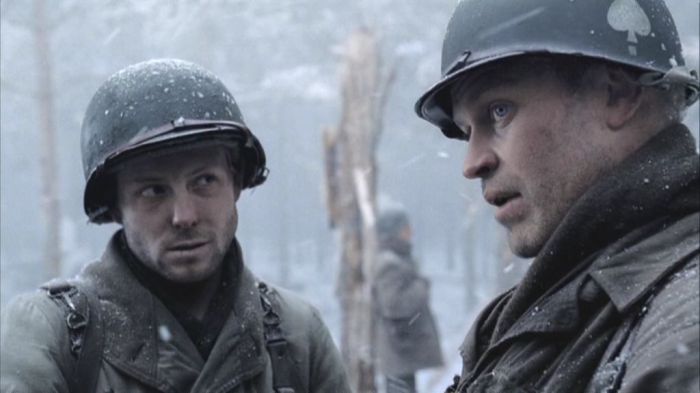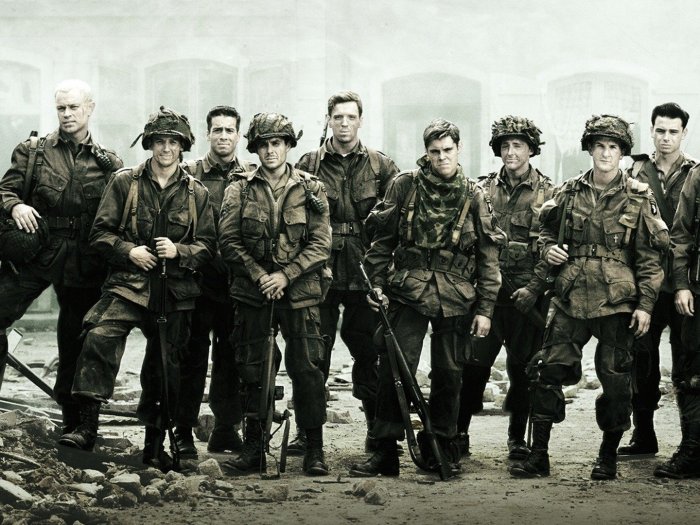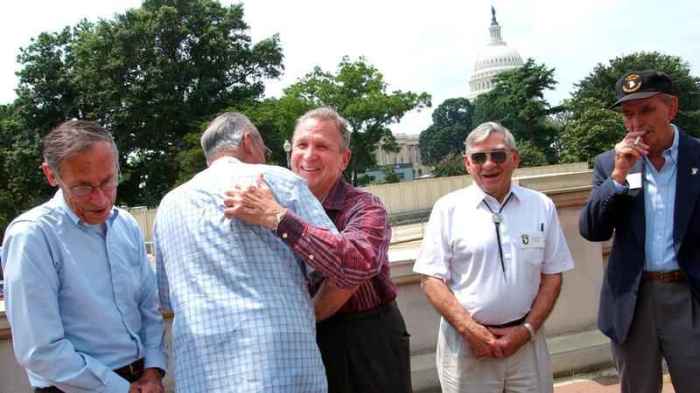Lt foley band of brothers – Embark on an extraordinary journey into the heart of the Band of Brothers miniseries, where Lt. Frank “Buck” Foley emerges as a pivotal figure. His unwavering leadership, profound relationships, and personal struggles paint a vivid tapestry of courage, resilience, and the indomitable spirit that defined the Easy Company.
Through the lens of Lt. Foley’s experiences, we delve into the pivotal battles of Normandy, Market Garden, and Bastogne, witnessing firsthand the sacrifices and triumphs that shaped the course of World War II.
Band of Brothers Series

The Band of Brothers miniseries, released in 2001, is a critically acclaimed historical drama that chronicles the experiences of Easy Company, 2nd Battalion, 506th Parachute Infantry Regiment, 101st Airborne Division, during World War II.
Based on the book of the same name by Stephen Ambrose, the series follows the company from their initial training at Camp Toccoa, Georgia, through their combat experiences in Europe, including the D-Day landings at Normandy, the Battle of the Bulge, and the liberation of Eindhoven and Berchtesgaden.
Historical Context and Significance
The 101st Airborne Division was one of the most elite units in the U.S. Army during World War II. They were trained for parachute assaults and glider landings, and were often used for high-risk missions behind enemy lines.
Easy Company was one of the most successful companies in the 101st Airborne Division. They earned a reputation for bravery and determination, and were awarded the Presidential Unit Citation for their actions in Normandy.
Lt. Frank “Buck” Foley
Lieutenant Frank “Buck” Foley was a platoon leader in Easy Company, 2nd Battalion, 506th Parachute Infantry Regiment, 101st Airborne Division during World War II. He was a close friend of Richard Winters and Lewis Nixon, and played a significant role in the Band of Brothers.Foley
was a natural leader, respected by his men for his courage, determination, and sense of humor. He was also a skilled tactician, and his platoon was often tasked with the most difficult missions. However, Foley also struggled with personal demons, including alcoholism and depression.
Leadership Style
Foley was a demanding but fair leader. He expected his men to give their all, but he was also willing to fight for them. He was always willing to listen to their concerns, and he always had their backs.Foley’s leadership style was influenced by his own experiences as a soldier.
He had seen the horrors of war firsthand, and he knew that the only way to survive was to rely on his men. He also knew that the best way to motivate his men was to lead by example.
Relationships with Other Characters
Foley was a close friend of Richard Winters and Lewis Nixon. The three men had known each other since training camp, and they had fought side by side through some of the most difficult battles of the war.Foley was also a mentor to many of the younger soldiers in Easy Company.
He was always willing to share his knowledge and experience, and he always looked out for their well-being.
Personal Struggles
Foley struggled with alcoholism and depression throughout his life. He often turned to drink to escape his problems, and he sometimes became violent when he was drunk.Foley’s personal struggles made it difficult for him to be a leader. However, he always managed to find the strength to carry on, and he never gave up on his men.
Battle of Normandy

The Battle of Normandy, depicted in Band of Brothers, was a pivotal moment in World War II. Lt. Frank “Buck” Foley and his fellow paratroopers played a crucial role in the D-Day landings and subsequent operations.
D-Day Landings
On June 6, 1944, Foley and his unit, Easy Company, 506th Parachute Infantry Regiment, 101st Airborne Division, parachuted into Normandy. Despite facing heavy German resistance, they managed to secure their objectives and establish a foothold in enemy territory.
Battle for Carentan
Foley and Easy Company fought fiercely in the Battle for Carentan, a key strategic town. They cleared German forces from the town, despite facing intense house-to-house combat. Foley’s leadership and courage were instrumental in their success.
Liberation of Sainte-Mère-Église
Foley and his unit played a pivotal role in the liberation of Sainte-Mère-Église, the first French town to be liberated on D-Day. They faced heavy German resistance, but managed to secure the town and liberate its inhabitants.
Operation Market Garden
After the Battle of Normandy, Foley and Easy Company participated in Operation Market Garden, a daring airborne operation in the Netherlands. Despite facing heavy losses, they fought bravely and contributed to the overall Allied effort.
Market Garden Operation
Operation Market Garden was an ambitious Allied operation that aimed to secure a series of bridges in the Netherlands to create a path for the Allied forces to advance into Germany. The operation involved a combination of airborne landings and ground forces, with the objective of capturing key bridges over major rivers and canals.The
operation faced numerous challenges, including strong German resistance, unfavorable weather conditions, and intelligence failures. The airborne landings were scattered, and the ground forces encountered heavy resistance as they attempted to link up with the paratroopers. Despite these challenges, the operation achieved some successes, such as the capture of the Nijmegen bridge.
However, the overall objectives of the operation were not fully met, and the Allies suffered heavy casualties.
Lt. Foley’s Involvement
Lt. Foley was part of the 101st Airborne Division, which was responsible for capturing the bridge at Son. The division faced fierce resistance from German forces, and Foley’s unit was forced to withdraw. Foley was wounded during the fighting, but he managed to escape and rejoin his unit.The
Market Garden Operation had a profound impact on Foley’s character. He witnessed the horrors of war firsthand and saw the devastating effects of combat on his fellow soldiers. The operation also tested his leadership abilities and forced him to make difficult decisions under pressure.
Bastogne Campaign: Lt Foley Band Of Brothers

The Battle of the Bulge was a pivotal battle in World War II. It was fought between the Allies and the Germans in the Ardennes region of Belgium, Luxembourg, and eastern France from December 1944 to January 1945. The battle was the largest land battle fought on the Western Front during the war, and it resulted in heavy casualties on both sides.
The Battle of the Bulge began on December 16, 1944, when the Germans launched a surprise attack against the Allied lines. The Germans quickly overwhelmed the Allied defenses and advanced rapidly into Belgium and Luxembourg. By December 21, the Germans had reached the town of Bastogne, which was a key crossroads and a vital supply route for the Allies.
Siege of Bastogne
The siege of Bastogne lasted for over a month. The Germans surrounded the town and cut off all supplies. The Allies were outnumbered and outgunned, but they refused to surrender. The siege was a desperate struggle, and the Allies suffered heavy casualties.
The camaraderie of the Lt. Foley Band of Brothers extended beyond the battlefield, as they faced the challenges of civilian life together. From navigating the intricacies of tract homes vs spec homes to navigating the complexities of family dynamics, their bond remained unbreakable.
The shared experiences of war had forged a deep connection that transcended the years, shaping their perspectives and guiding their choices as they rebuilt their lives.
However, they were able to hold out until reinforcements arrived on January 16, 1945.
Lt. Foley’s Leadership, Lt foley band of brothers
Lt. Foley was one of the leaders of the 101st Airborne Division during the siege of Bastogne. He was a courageous and inspiring leader, and he played a key role in the Allied victory. Foley was responsible for organizing the defense of the town and for motivating his troops to fight on despite the overwhelming odds.
Foley’s leadership was essential to the Allied victory at Bastogne. He was a brave and dedicated leader, and he inspired his troops to fight to the end. Foley’s leadership is a testament to the power of human spirit and the importance of never giving up.
Band of Brothers Legacy

Band of Brothers, the acclaimed miniseries, has left an enduring mark on popular culture and historical understanding. Its powerful storytelling and meticulous attention to detail have made it a seminal work in the depiction of World War II and its impact on the lives of those who fought.
The series has had a significant influence on the public’s perception of the war. Its realistic portrayal of combat and the challenges faced by soldiers has helped to dispel romanticized notions of warfare and to convey the true horrors of conflict.
Cultural Significance
- The series has been widely praised for its authentic portrayal of the war, which was based on extensive research and interviews with veterans.
- The characters, drawn from real-life figures, are complex and relatable, and their stories have resonated with audiences worldwide.
- The series has been credited with raising awareness of the sacrifices made by soldiers in World War II and with fostering a greater appreciation for their courage and resilience.
Historical Understanding
- Band of Brothers has helped to shape historical understanding of the war by providing a vivid and immersive account of the experiences of ordinary soldiers.
- The series has also shed light on the challenges faced by soldiers in the aftermath of the war, including post-traumatic stress disorder and the struggle to reintegrate into civilian life.
- The series has been used as a teaching tool in schools and universities to help students understand the complexities of World War II and its impact on individuals and society.
Questions Often Asked
Who was Lt. Frank “Buck” Foley?
Lt. Foley was the platoon leader of the 2nd Platoon, Easy Company, 506th Parachute Infantry Regiment, 101st Airborne Division.
What was Lt. Foley’s leadership style?
Lt. Foley was a respected and effective leader who inspired loyalty and trust among his men. He was known for his courage, determination, and ability to make quick decisions under pressure.
What were some of Lt. Foley’s most notable experiences?
Lt. Foley fought in some of the most pivotal battles of World War II, including the Battle of Normandy, Operation Market Garden, and the Battle of the Bulge.